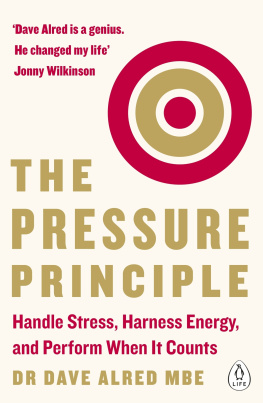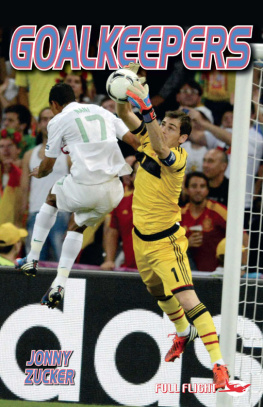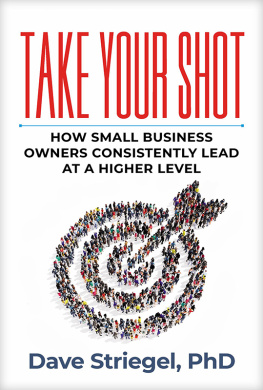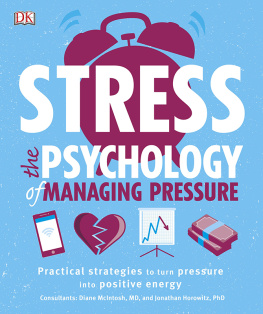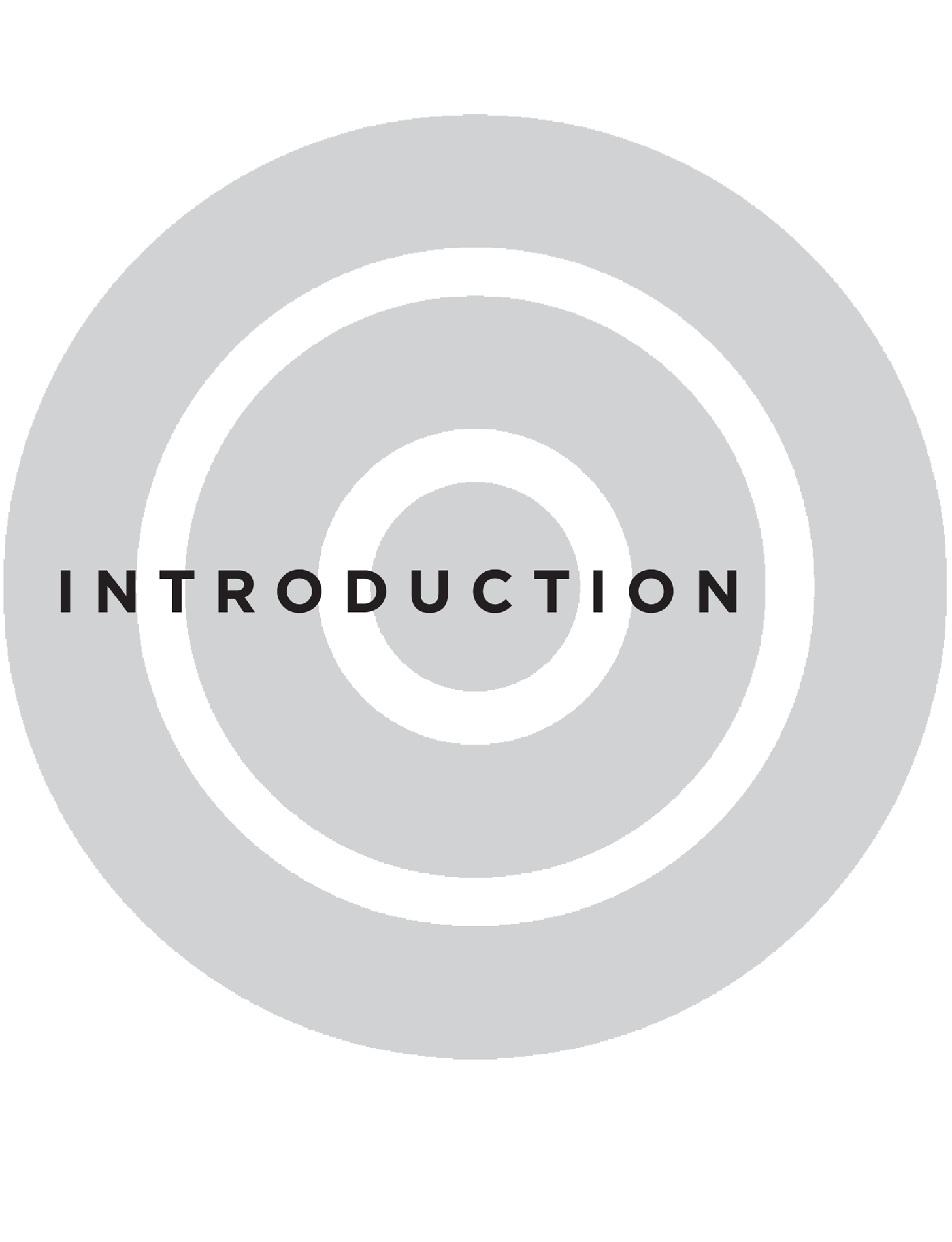Contents
Dr Dave Alred MBE
THE PRESSURE PRINCIPLE
Handle Stress, Harness Energy, and Perform When It Counts
PENGUIN LIFE
UK | USA | Canada | Ireland | Australia
India | New Zealand | South Africa
Penguin Life is part of the Penguin Random House group of companies whose addresses can be found at global.penguinrandomhouse.com.
First published 2016
Copyright Dave Alred, 2016
The moral right of the author has been asserted
ISBN: 978-0-241-97510-7
THE BEGINNING
Let the conversation begin...
Follow the Penguin Twitter.com@penguinUKbooks
Keep up-to-date with all our stories YouTube.com/penguinbooks
Pin Penguin Books to your Pinterest
Like Penguin Books on Facebook.com/penguinbooks
Listen to Penguin at SoundCloud.com/penguin-books
Find out more about the author and
discover more stories like this at Penguin.co.uk
This book is dedicated to all thosewho think they cant
Under Pressure
At the end of a long and stressful week at work, youve finally completed your report. You gather up the crumpled pages of notes that have been your crutch for the last few days and screw them into a ball before leaning back in your chair and tossing them towards the waste bin on the other side of your office.
Bullseye! You congratulate yourself on a perfectly judged throw. Everyones a champion when no one else is looking.
Jack, a colleague, walks in, smiling mischievously. A pound says you cant make that throw again, he says.
Youre on. The stakes are low, your confidence is high and the shot is makeable. You take aim
Woah, not so fast, hot shot, interrupts Jack. Lets make this a bit more interesting.
Jack heads down the corridor to summon everyone on your floor, offering them bets on the throw, telling them its easy money that youll never make the shot from twenty feet. Soon, your office has more people in than ever before and the jar containing the stake money is half full. It doesnt stop there.
In his new role as bookmaker, Jack spreads the word news travels fast in this company and before long its out of control: your office is rammed, people are crowding the corridors and pressing up against the windows and bets are being laid thick and fast.
Ive got a fiver on this, pipes up someone.
Put me down for ten, says another.
Of course, you cant back down, so you take every bet thrown your way. Even the CEO gets in on the act, wagering a cool fifty quid that you wont make it. The chatter is incessant, the tension palpable and the pot is swelling at just over a thousand pounds as Jack finally closes the book and, like an admonishing umpire at Wimbledon, calls for, Quiet, please.
A hush descends. All eyes turn to you. One shot for glory.
You take the paper ball it feels alien and unfamiliar between your palms and roll it tighter, thinking about how best to make the throw, about what happens if you dont. A thousand pounds! Your palms feel clammy, your chest is tight, your heart pounding.
The eyes of your colleagues bore into you. This is it: your putt for victory in the Ryder Cup, the last-minute penalty to win a World Cup final. Your chance to make office history.
With dry mouth and knotted stomach, you take back your arm. How did I do it before? You try to visualize it going in the bin as you bring your arm forward and release the paper ball. It leaves your hand and the room draws breath as it arcs through the air
Pressure Defined
We all have our own definition of pressure. For some its the pressure to present to a new client at work. For others its the stresses involved in running their own business. Many of us face the pressure to juggle long hours at work with being a good parent at home and plenty know all too well the pressure to make ends meet. Its not just this objectively serious kind of pressure we can relate to. We can feel pressure when were meeting people for the first time, be they new colleagues at work or a partners social group, or even in moments when we might feel silly for getting worked up, such as waiting at the start of our own birthday party for people to arrive. We can put ourselves under immense pressure to achieve when we tackle things like running a marathon or performing in an event that matters to us whether in a five-a-side football tournament, a local play or even throwing a ball of paper into a bin. Pressure can create a very personal kind of pain.
Yet although it means different things to different people, and can affect us in a variety of ways, we all recognize its effects in ourselves and others. People under pressure nearly always betray symptoms. Some are better than others at managing them or hiding them, but we recognize their imprint. And outside our own social sphere, when we watch sport and films and television programmes, we can see it there. Were familiar with the toll it takes be it on a player trying to pot an easy-looking black to win the World Snooker Championship or an onscreen hero trying to defuse a bomb because we feel pressure in our own lives, albeit usually on a more modest stage and in less perilous circumstances. Sport and drama magnify the tensions we know all too well from first-hand experience.
Pressure means something different to everyone, so how might we begin to define it clearly as something we can all understand? You might think a dictionary would be a good place to start, but its easy to become lost in the many definitions that dont quite tap into the core of what it is that we all feel when facing pressure. And that is where our attentions should be directed. It is the effects of pressure that concern us, that inhibit us. How is it that some of us can deliver a great performance when it matters most while others visibly wilt under the strain?
Anxiety, elevated heart rate, sweating, feeling tight in the shoulders or neck, headaches, butterflies and nausea are just some of the physical symptoms we can experience as a result of pressure. The mental effects can be just as pronounced: our confidence, concentration, memory, emotional control, decision-making, sense of perspective, ability to remain present and in the moment can all be compromised when were under pressure, preventing us from doing something we might manage easily in a more relaxed environment.
Top-level sportsmen experience these effects just like the rest of us, and professional sport is littered with expressions such as performance anxiety and choking. Of course, they have learned, using some of the methods I will describe in this book, how to manage these effects better than many performing in front of thousands of people regularly will do that to a person. But anyone who has watched a penalty shootout will know that no one is immune to pressure not even the very best.

